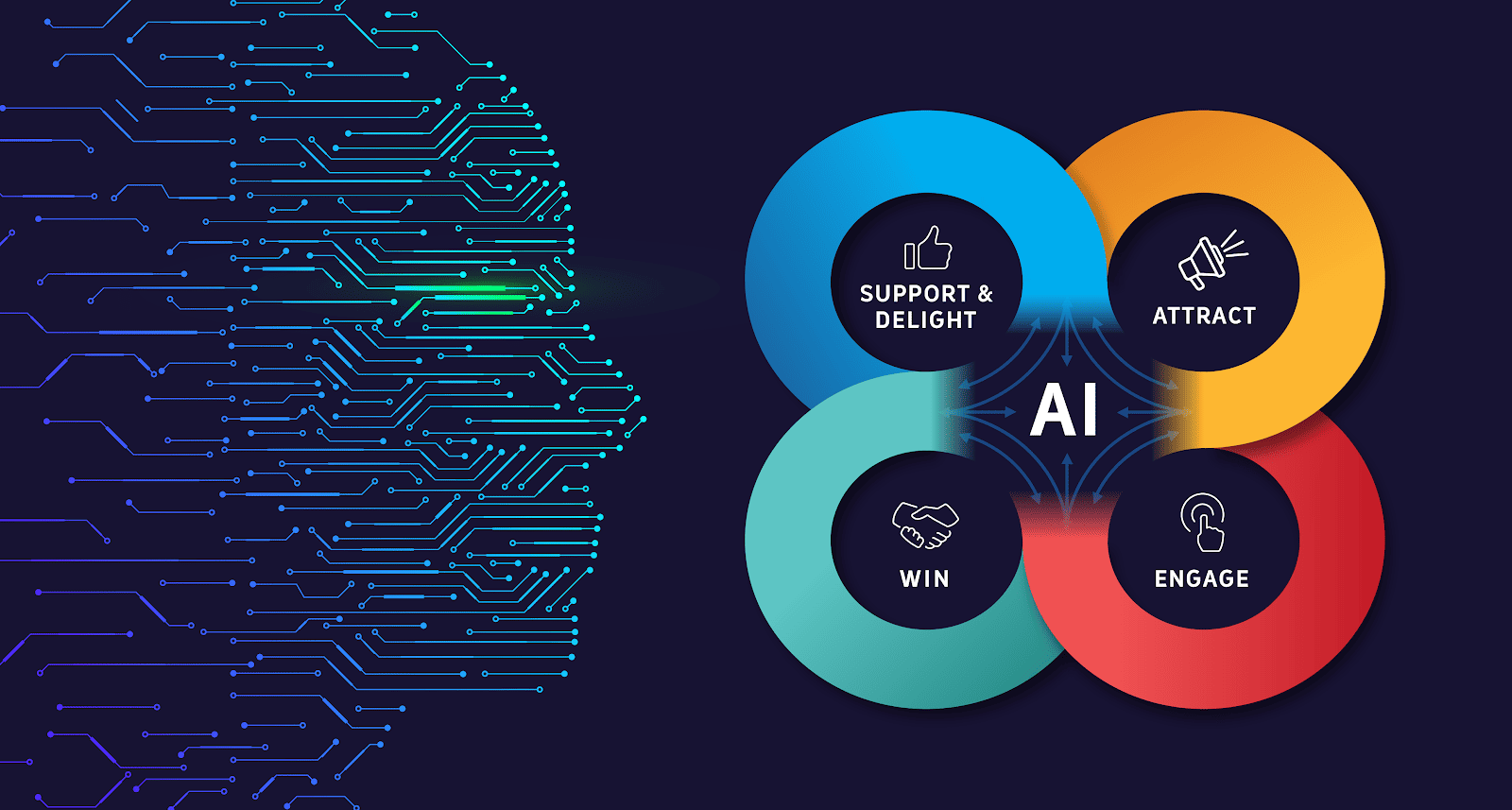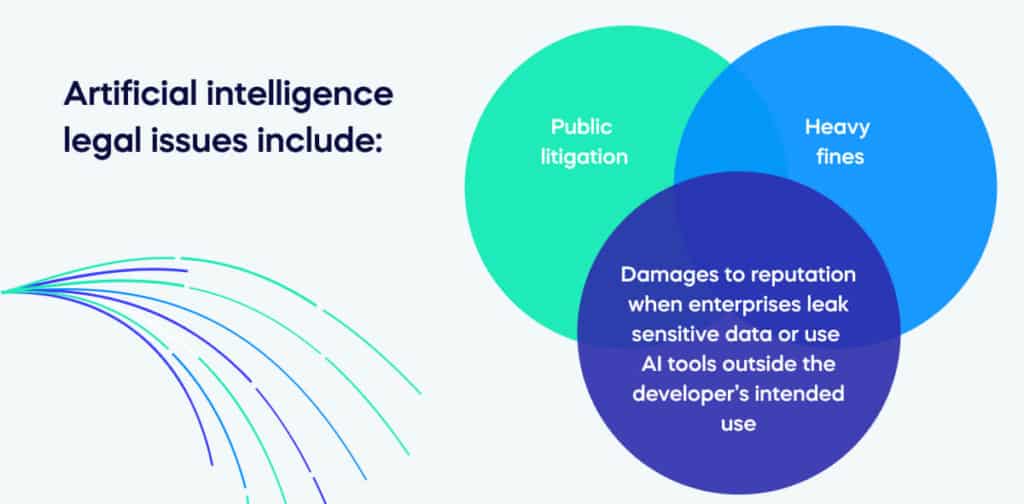Navigating the Digital Minefield: Challenges and Risks of AI Marketing
As we dive into the high-tech world of AI marketing, we’re faced with tough calls and hidden traps. Every step forward asks, “Are you ready for the challenges and risks of using AI in marketing?” It’s not just about making sales soar; it’s about wrestling with tough ethical choices, keeping trust alive, and playing by the rules while pushing boundaries. From the sly biases hiding in the code to the laws that strap down our creative drive, we’re in this to win it, and I’m here to guide you through. Let’s crack each nut together and make sure we don’t step on a digital landmine.
Understanding Ethical Implications in AI Marketing
AI marketing ethical concerns
When we dive into AI in marketing, we hit a big question. How do we keep it fair for everyone? A straight answer is we must always check our AI tools for fairness. We do this often and with care. This means looking at our AI and asking, “Does it treat all people the same?” If not, we’ve got to fix it.
AI can be like a kid in a candy store with data. It sees so much! But we must teach it to respect privacy. That’s a must. Folks worry that AI might be too nosy, getting into their private stuff. So we draw clear lines. We tell AI, “This is where you stop.” And we stand by that rule.
Now for a tough one – can AI trick us? Yes, if we let it. That’s why we talk about AI transparency issues. Think of AI like a magician. We love the tricks, but we also want to know “How did you do that?” So we push for AI to show its hand. That means making sure people know how AI thinks.
Trust is gold. We all get that. We’ve got to keep trust up with everyone our marketing reaches. So we ask, “Hey, do you feel okay with how we use AI?” We listen hard and act on what people say. That’s how we keep trust alive and kicking.
Let’s not forget the folks who make sure everything runs right. Call them the AI ethics police if you like. They check that the AI plays by the rules. This is what we mean by AI accountability in marketing. Without it, we’re flying blind. And that’s a no-go.
Artificial intelligence biases
Here’s another brain twister. Can AI be unfair? Sure can. This is about artificial intelligence biases. It’s a bit like AI wearing tinted glasses. It doesn’t see everyone the same. So what do we do? We work to give AI a clear view. We scrub off those tints so it can be fair to all.
Personalization is cool, but it’s a fine line. We like stuff made just for us, right? But we also want our space. So we juggle personalization with privacy. It’s like saying, “Here’s what’s up for grabs, but we’ll back off if you say so.”
And hold up, what about the risks? AI is not perfect. From cybersecurity risks to slips in machine learning, we’ve got to keep our eyes peeled. AI might mess up, taking a wrong step. We call these AI interpretation errors. They can get messy. But we learn and we fix them.
With all this tech, it’s easy to lean on AI too much. Over-reliance on AI technology is a biggie. Imagine leaning on a weak stick. Oops, down you go! We can’t let AI become that stick. We balance tech with human smarts. That mix is key.
Finally, jobs. As AI jumps in, we could see jobs change. That’s job displacement from AI automation. It’s like a new player joining the game. We gotta make sure everyone still has a place to play.
So, as an AI ethics and compliance expert, I guide through this digital minefield. It’s dicey, but oh boy, is it worth it. We make AI our ally, not our overlord. We keep it true, fair, and in line. That’s how we win the game.
Maintaining Consumer Trust Through Privacy and Transparency
Data Privacy in AI Marketing
We all worry about who sees our data. Marketers use AI to learn what you like. They must keep this data safe. The big question is: how do we use AI without crossing lines?
Data privacy in AI marketing is a hot topic. This is because your private data, like where you shop and what you buy, can tell a lot about you. Companies use this info to show you ads they think you will like. But if they’re not careful, they can misuse your info.
For example, did you know artificial intelligence can guess your needs before you do? Scary, right? But when AI gets too nosy, people feel uneasy. That’s why it’s key for companies to balance getting to know you and keeping your trust. No one likes feeling spied on.
Trust is golden. If you can’t trust a brand, will you buy from them? Probably not. Brands that respect privacy earn trust. They are open about what data they collect and why. When a brand is clear about their AI, people like that.
So, brands need clear rules for AI use. This means being open about what they do with data. It’s like having a friend who tells you all about a secret. It builds trust.
Consumer Trust and AI
Consumer trust is a must in our AI world. Trust makes us feel safe when we buy stuff. Like, if a store keeps our card info secure, we come back. With AI, it’s the same deal. When AI treats us right, we trust it.
AI has to show it’s reliable. Say an AI suggests a perfect gift for Mom. That’s good AI. But if it gets too pushy or weird, that’s bad. Businesses need to get this right. If folks get freaked out, they’ll walk away.
Think about it. Would you shop at a place that gets your name wrong? No way! And if AI keeps messing up, we won’t trust it. AI must be smart and spot on.
Lastly, AI brings up a lot of questions. Is it fair for all? Does it make mistakes? These are hard to answer. But a good start is making sure AI plays fair with our data. This means setting up strong rules. And sticking to them.
In the end, caring about privacy and being clear is what it’s all about. Brands that do this will be our favorites. They’ll stand out. And we’ll keep coming back. Because with trust, both sides win.
Balancing Innovation with Accountability and Compliance
AI accountability in marketing
We must keep AI fair and honest. It’s not easy, but we owe it to our customers. So, what is AI accountability in marketing? It’s making sure the AI we use treats people right and follows the rules. It’s about being able to show our work, like in school math class. We can’t just say, “AI chose this,” and call it a day. We have to be ready to explain why AI made that choice.
Think about a teacher using a key to grade a test. That key needs to be right, or it’s not fair. It’s the same with AI in marketing. If the rules or ‘key’ it uses have mistakes, it could be unfair to some folk. That’s what we call bias. And bias is a big no-no. If folks think our AI picks favorites, they won’t trust us. No trust, no customers.
Legal challenges in AI applications
Legal stuff can be like a big, scary forest. Now, toss in AI, and it’s even wilder. Why? ‘Cause laws for AI are still kind of new. So, how do we handle legal challenges in AI applications? We stay sharp! We learn about the rules, old and new. We make sure our AI follows them. And when the rules change, we change, too.
Imagine we’re playing a game, and halfway through, the rules switch up. We’d have to learn fast or lose. It’s the same with AI in marketing. If a new law kicks in, saying how we can use customer data, we adapt. Quick. If we mess up, that could mean big trouble, like fines or even having to shut down our project.
So, here’s what we do. We check the AI ’cause we care about keeping it right. We make sure it’s clear to customers how we use data. We work with the smart legal folks to stay in the clear. And we always keep an eye out for what might go wrong. That way, we can fix it before it does.
Remember, AI is a tool, kind of like a superpowered hammer. We need to use it to build things up, not smash things down. When we balance new tech with being fair and playing by the rules, everybody wins.
Now, keeping up with laws and being able to explain AI decisions sounds tough, right? It is. But here’s a secret: it’s also really cool. We get to work out puzzles every day. We keep learning and growing. And the best part? We help build a future where marketing is smart, kind, and something we can all trust. That’s a game worth playing.
Navigating Operational Challenges in AI Deployments
Job displacement from AI automation
Let’s tackle a big worry: jobs going poof because of AI in marketing. Does AI take away jobs? Yes, it does. Some jobs shrink or vanish as AI steps in. But, hey, don’t hit the panic button yet. AI creates new jobs too. Think of AI as a tool, not the boss. We train AI. We guide it. We run the show.
Still, fears stick around like gum on a shoe. Folks worry about their future. “Will a robot do my work?” they ask. Fair question. The short scoop is this: AI loves tasks that are dull, dirty, or dicey. It’s not so hot at things needing a human’s touch. No machine nails a friendly chat at the coffee shop. Not like you or me.
Now, let’s break it down. Some skills are ripe for automation. This means less need for humans doing those bits. Here we’re talking about jobs like sorting data or running repetitive reports. Bot work. On the up side, this can free us up. More time for the brainy, creative stuff. More chances to shine.
Still, it’s a bumpy road. Companies must help teams adjust. Some folks might need new skills. Others may dive into fresh roles carved out by AI advances. Let’s not sugarcoat it, though. It’s tough. It means change, and change is hard. We all need to stay on our toes.
What about marketing pros? AI can shake things up here too. It changes how we pitch products, chat with buyers, and spread the word. Ads get smarter. Targeting gets sharper. It’s all about hitting that sweet spot. The one that makes buyers nod and say, “Yes, that’s for me!”
But remember, folks are behind the scenes. They’re making sure AI plays fair and stays on point. This gig now calls for new hats. Hats like “AI trainer” or “ethical watchdog.” And, who knows? We might just invent more jobs as AI keeps growing. It’s all about staying nimble, pals.
AI and marketing costs
Money talk: AI ain’t cheap. It’s true. Setting up AI can drain your wallet. Think of fancy AI tools and big data banks. Ka-ching! Costs climb fast. And there’s more. You need a crew that knows their AI onions. Hiring smart heads can add up.
But it’s not all gloom and cash burn. AI can save dough in the long run. How? By doing tasks faster and cutting down on errors. This is good stuff. It means less waste and more bang for your buck.
Let’s chew on this. What if AI sniffs out trends we miss? Those gems hidden in the data swamp. They can lead to hot-selling items and less time scratching our heads. That means cash saved, happy chiefs, and a business buzzing along.
Here’s the lowdown. Weigh it out. The start-up costs can make you gulp. But zoom out. Look at the full picture. AI’s slick moves can turn into big wins. Like crafting deals folks can’t resist. Or finding ways to keep buyers coming back.
In the end, the sticker price is just the start. Slide past it. There’s a land of perks waiting on the other side. If we play it smart, AI’s costs don’t look so scary. They look like a smart play for a bold future.
That’s the scoop on jobs and cash in the AI marketing game. It’s a mix of good, bad, and let’s figure this out. Keep your eyes open and stay on your toes, friends. AI’s here to play. Let’s make sure we’re ready to join the match.
In this post, we tackled big ideas in AI marketing. From ethical concerns to biases, we dug deep. We know that data privacy is key to keeping trust. We must balance new tech with being answerable and lawful. AI changes jobs and costs, too.
I think it’s vital we use AI smartly. We must guard our buyers’ secrets and stay honest. We face hard choices – innovate or stick to the rules? Also, we can’t ignore the folks who might lose jobs or the cost to play this AI game. Let’s use AI to make things better, not just for quick wins. That’s how we keep trust and stay ahead.
Q&A :
What are the common challenges faced when implementing AI in marketing strategies?
Integrating Artificial Intelligence (AI) into marketing strategies comes with its fair share of hurdles. Some of the common challenges include the large initial investment required for AI technology, the complexity of integrating AI with existing marketing systems, and the need for skilled personnel capable of managing and interpreting AI-driven insights. Ensuring data quality and dealing with the potential biases AI systems might learn from historical data also pose significant issues. Additionally, marketers may struggle with maintaining the balance between personalized experiences and customer privacy.
How does AI pose a risk to customer privacy in marketing?
AI systems in marketing often leverage consumer data to personalize experiences and target audiences more effectively. However, this same capability presents a risk to customer privacy. AI can analyze vast amounts of personal data, and if not managed properly, it could lead to inadvertent data breaches or misuse. Ensuring that AI is compliant with privacy regulations like GDPR and ensuring the ethical use of customer data is essential to mitigate this risk.
In what ways can the use of AI in marketing backfire for businesses?
While AI can provide numerous advantages for marketing, it can sometimes have unintended negative consequences. For instance, if AI-driven marketing efforts are not carefully monitored, they could result in the dissemination of messages that are off-brand or culturally insensitive, leading to backlash and damage to the brand’s reputation. Over-reliance on automation might also result in less human engagement with customers, potentially missing out on nuanced customer needs and preferences.
What are the ethical considerations when using AI for marketing purposes?
The ethical implications of using AI in marketing are multi-faceted. One of the primary concerns is the potential for AI to perpetuate and amplify existing biases, which can lead to discriminatory marketing practices. Moreover, the potential manipulation of consumer behavior through highly personalized and persuasive AI algorithms raises ethical questions, as does the transparency of AI decision-making processes. Businesses must consider these factors to maintain consumer trust and avoid ethical pitfalls.
How can businesses mitigate the risks associated with AI in marketing?
To mitigate the risks of using AI in marketing, businesses should invest in robust data security measures to protect customer information. They should establish transparent AI policies and ensure compliance with all data protection laws. Ongoing AI audits can help identify and correct biases or flaws in the system. Furthermore, staff training on AI capabilities and ethical guidelines can help align AI marketing initiatives with company values and customer expectations. Engaging with AI ethics experts or establishing an ethics board can also guide responsible AI use in marketing campaigns.




